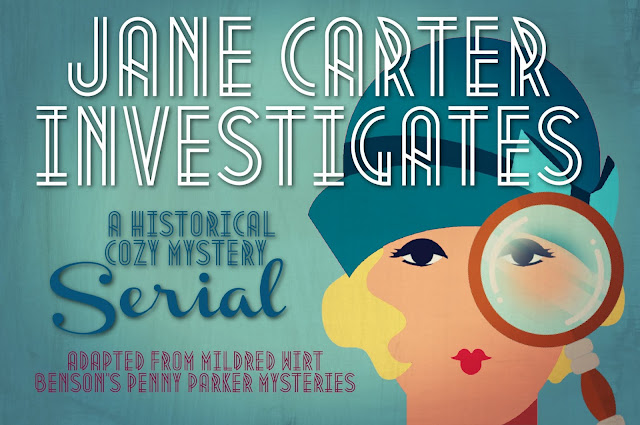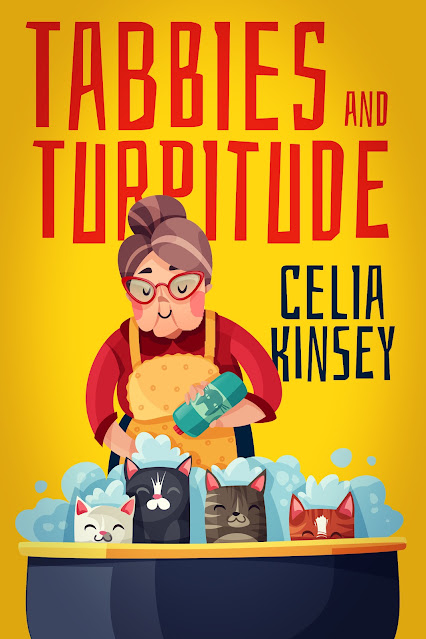Jane Carter Investigates Episode One-Hundred and One
The girl whose pocketbook had been lost
remained by the railing, quite forgotten. Tears streamed down her cheeks.
“Excuse me,” I said to her, “is there
anything I can do to help?”
Disconsolately, the girl shook her
head. She made a most unattractive picture. Her blouse was wrinkled, and her
skirt was spotted with an ugly coffee stain. Beneath a dark blue, misshapen
roll-brim hat hung a tangle of brown hair.
“Someone stole my pocketbook,” she said
listlessly. “I had twelve dollars in it.”
“You’re sure you didn’t leave it
somewhere?” Florence asked.
“No, I had it in my hand only a minute
ago. I think someone lifted it in the crowd.”
“A pickpocket, no doubt,” I said. “I’ve
been told they frequent these river boats.”
“Nearly everyone has left the steamer
now, so I suppose it would do no good to notify the captain,” said Florence.
“You have friends meeting you at the
boat?” I asked.
“I haven’t any friends—not in
Greenville.”
“None? Don’t you live here?”
“No, I’ve been working as a waitress at
Little Falls, upriver. The job played out last week. Today I took this boat,
thinking I might find work in Greenville. Now I’ve lost my purse, and I don’t
know what to do or where to go.”
“Haven’t you any money?” I asked.
“Not a cent. I—I guess I’ll have to
sleep in the park tonight.”
“No, you won’t,” I said. I opened my
purse, took out a five-dollar bill and thrust it into the girl’s hand. “This
isn’t much, but it may tide you over until you can find work.”
“You are very kind to help me. I’ll pay
you back just as soon as I get a job.”
“Don’t worry about that,” I said.
“However, I should like to know your name.”
“Rosie Larkin.”
“Mine is Jane Carter, and my friend is
Florence Radcliff. Well, good luck in finding that job.”
“You were generous to give a stranger
five dollars, Jane,” Florence said when we out of earshot of Rosie.
“She needed it.”
“But that was the last of your money
from the final installment of ‘Evangeline: The Horse Thief’s Unwilling
Fiancée,’
wasn’t it? What are you going to do if you can’t talk Mr. Pittman into buying
another serial from you? Perhaps calling the hand that feeds you a scurvy knave
and a pustule on the face of literature was a trifle unwise.”
“No,” I said. “Those were perfectly
merited criticisms. Where I may have gone a step too far was informing him that
I did not wish to see or speak to him again in this world or the next and that
my proclamation extended to a prohibition against written correspondence.”
Mr. Pittman is my editor—or at least he
used to be. Mr. Pittman owns Pittman’s
All-Story Weekly Magazine, which was the source of my meager income before
I developed a serious beef with the aforementioned after he authorized
unforgivable changes to the final installment of my long-running serial
‘Evangeline: The Horse Thief’s Unwilling Fiancée.’
“I don’t know how I’m going to keep myself in stockings and foundation
garments,” I admitted to Flo, “but bringing in Mr. Herbert Hickenloper—or
whatever the dastardly man’s name was—from the advertising department to
butcher the last installment and make Evangeline marry the evil horse-thief
masquerading as the upstanding rancher was unforgivable. Reformed horse-thief,
bushwa! Damascus road conversion, phonus bolonus! That horse thief was an
unrepentant fiend without a shred of remorse or humanity left in him. At the
very least, Mr. Franklin Funkhouser, junior advertising copywriter—or whoever
it was ended up putting those disgraceful words down on paper—should at least
have allowed Evangeline to end up with the worthy hero. After all, the man had
endured being unjustly framed as the real horse-thief for the last one thousand
forty-seven and three quarters column inches. After the hero lost his right arm
rescuing the heroine from a pack of ravening wolves, that’s the least that
could have been done for him.”
“But in your original manuscript you
didn’t let the hero get the girl, either,” Flo pointed out. “That’s what led to
Mr. Pittman’s order to alter your final installment in the first place, and I
can’t say I entirely blame him. It was supposed to be a romance. Somebody was
supposed to get the girl.”
“Why?” I said. “I gave them a
bittersweet but dignified farewell. The dastardly villain was vanquished,
Evangeline’s stern and dimwitted Victorian father was duly chastened and
rebuked, and the one-armed cowboy hero was fully vindicated and looking forward
to a promising career in the United States Senate representing the great state
of Montana. Most importantly, Evangeline was finally free to follow her
lifelong dream to become a world-famous mezzo-soprano and tour the opera houses
of Europe.”
“Why couldn’t Evangeline have married
the hero and become a world-famous
mezzo-soprano?” Flo asked.
“A one-armed cowboy would have been
miserable being dragged all the way across the Atlantic and then all over
Europe. He’d miss his cows. His horse would pine away for him, develop equine
ulcers and go off her feed. Not to mention that all that ocean-liner and train
travel would have given our cowboy hero motion sickness. You remember what
happened to him in installment seven when the dastardly villain suspended him
upside down by the feet from that tree branch and set our worthy hero to
swinging back and forth like the pendulum of a clock.”
“But was it essential that Evangeline
pursue a career as a world-famous mezzo-soprano?” Flo argued. “She could have
given it up for love; lots of people give up promising careers for love. Well,
they do in stories, anyway.”
“Even if Evangeline had been willing to
relinquish her lifelong dream,” I insisted, “it still would have been a
disaster. Evangeline was temperamentally unsuited to be a politician’s wife.
Someday she might have had to become First Lady, and you know what a thankless
job that is. No, they’d have only made each other miserable, in the end. I
believe it might even have ended in an acrimonious divorce.”
Flo just rolled her eyes.
“If I had the money,” I said. “I’d
start my own all-story magazine. I’d specialize in realistic depictions of love
and romance.”
“You mean you’d print more stories
where the hero loses essential parts of his anatomy and then ends up
brokenhearted and alone?” Flo asked, without cracking a smile. “Besides, I
thought you were pinning all your hopes on finding a publisher for your novel?”
“It’s not essential that the hero gets
maimed,” I said. “I merely added that in a fit of pique when Mr. Pittman vetoed
my idea of Evangeline fighting off the pack of ravening wolves singlehandedly,
armed with nothing but a flaming torch and an improvised dagger fashioned from
her corset stays. And yes, I am still optimistic that Litchfield Press will see
fit to add Perpetua’s Promise to
their literary offerings.”



Comments
Post a Comment